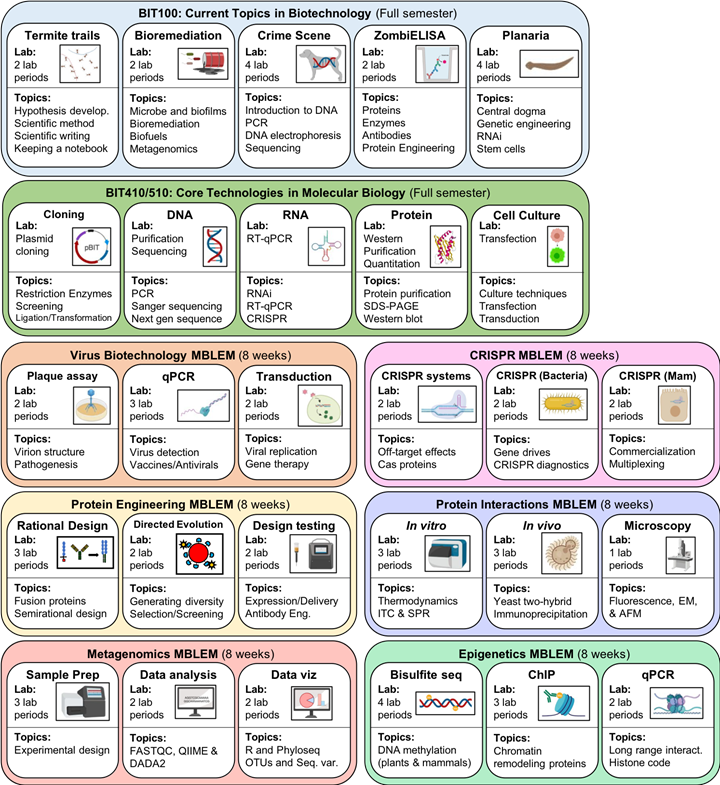IPERT
The NIH-funded NC State IPERT program brings together partner institutions to develop molecular biotechnology courses that are research-based.
The BIT Program is dedicated to the implementation and expansion of hands-on, inquiry-based laboratory exercises for the education of future STEM professionals. Our instructors, including teaching postdoctoral scholars, design novel laboratory courses based on current scientific inquiries in their respective fields. We bring together a variety of areas of expertise, including biochemistry, microbiology, plant biology, bioinformatics, and more to educate students from equally diverse backgrounds across campus. Through the Innovative Programs to Enhance Research Training (IPERT) funded by the National Institute for Health (NIH), six diverse higher education institutions are collaborating to enhance biotechnology research courses.

These novel inquiry-based lab courses, or MBLEMs (Molecular Biotechnology Laboratory Education Modules), teach fundamental and cutting-edge biotechnology techniques and are the backbone of our BIT minor and certificate programs. Many of our MBLEMs have been published in peer-reviewed education journals with the goal of dissemination to the higher education STEM community. These include our core molecular biology techniques course and courses on Protein-Protein and Protein-DNA interactions. Protocols and syllabi from the MBLEMs are also available on our QUBES collaborative site.
In order to facilitate the dissemination of these MBLEMs, the BIT Program has obtained an NIH IPERT grant to partner with five institutions in order to streamline the process of adapting lab modules across diverse settings. Our partners currently include Alamance Community College, Centre College, Emory University, North Carolina Central University, and the University of North Carolina – Pembroke, with the goal of adding additional partner institutions.
Despite the accelerating expansion of online resources for modern life science education and training, the reality is that the development of molecular biology laboratory-based skills requires “hands-on” instruction, preferably in a research-oriented context. Educational strategies that rely on lecture alone or traditional, but outdated, laboratory experiences ineffectively prepare the current and future generations of the US biomedical workforce. New paradigms are needed for molecular biology lab training that are flexible, inclusive, broadly applicable and supportive of inter-institutional cooperation, all of which is addressed in the proposed project.
NIH: 1R25GM130528-01A1
IPERT News
- IPERT team publishes article about outreach event with the North Carolina School for the Deaf (NCSD) and the NSF STEM BUILD team.
- Harris FR, Sikes ML, Bergman M, Goller CC, Hasley AO, Sjogren CA, Ramirez MV and Gordy CL (2022) Hands-on immunology: Engaging learners of all ages through tactile teaching tools. Front. Microbiol. 13:966282. doi: 10.3389/fmicb.2022.966282
- IPERT Summer 2022 In-person Workshops brought together all five partner sites for experiments, discussions, and planning. Learn more about the Summer 2022 Workshops.
- BIT publishes article about integrating bioinformatics tools into inquiry-based MBLEMs:
- Goller CC, Srougi MC, Chen SH, Schenkman LR and Kelly RM (2021) Integrating Bioinformatics Tools Into Inquiry-Based Molecular Biology Laboratory Education Modules. Front. Educ. 6:711403. doi: 10.3389/feduc.2021.711403
- BIT Faculty receive online course design grant from NC State’s DELTA to develop an online BIT 410/510 course.
- BIT Faculty Dr. Melissa Srougi receives an exploratory grant from NC State’s DELTA to develop a series of virtual reality-based student-driven training videos on biotechnology laboratory techniques.
- BIT Teaching Postdoctoral Scholar, Dr. Leigh Ann Samsa, and BIT graduate teaching assistants Adam Groth and Linnea Andersen publish CRISPR lesson.
- New BIT Teaching Postdoctoral Scholar, Dr. Drew Hasley publishes an article on cultivating inclusive instructional and research environments.